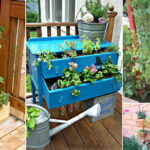Engaging in yard work and gardening is an endeavor cherished by many, not just for its tangible outcomes, but also for the spectrum of psychological and physiological benefits it proffers. It is not merely a chore or a task to be completed, but a holistic activity that fosters personal growth, sustains environmental health, and enhances community cohesion.
Understanding why individuals derive joy from gardening and yard work requires exploring several dimensions: personal fulfillment, connection to nature, and the cultivation of community. Each of these areas encapsulates vital insights into the allure of tending one’s own green spaces.
The pursuit of gardening offers profound personal satisfaction, often facilitating rites of passage and self-actualization. Individuals may engage with nature in unique ways, finding solace in the rhythmic patterns of planting, weeding, and harvesting. The aesthetic appeal inherent in well-maintained gardens evokes a sense of accomplishment. The act of planting a seed and nurturing it until it blooms or bears fruit exemplifies patience and perseverance. This transformative journey can anchor individuals to their identity and place in the world, reinforcing a sense of purpose. Through the tangible results of labor, gardeners often experience increased self-esteem and confidence, as each flower or vegetable reflects their dedication and hard work.
Furthermore, gardening aligns with the concept of restorative practices. The therapeutic aspects of gardening are well documented; studies indicate that it’s an excellent stress reliever. Interacting with the earth often promotes mindfulness, transcending the distractions of modern existence. Engaging the senses—feeling the soil, observing plant colors, listening to the sounds of nature—can cultivate a meditative state, allowing one to disconnect from the overwhelming stimuli of daily life. Researchers have pointed out that exposure to green spaces corresponds with reduced anxiety levels and improved mood stability, thus advocating for gardening as a potent antidote to contemporary psychological woes.
Connection to nature extends beyond personal benefits, engendering an understanding of environmental stewardship. Engaging in yard work allows individuals to contribute actively to the ecosystem. The practice of establishing home gardens serves as an exemplary model of sustainable living, where the focus shifts to local food production and self-sufficiency. As people grow their own fruits and vegetables, they inevitably become more conscious of the impacts of industrial agriculture on the planet and their health. Such awareness can transform consumer attitudes, promoting a preference for organic practices over chemically reliant ones.
Moreover, gardening cultivates biodiversity. In adopting practices that prioritize native plants and sustainable methodologies, individuals help to restore local habitats. This intricate relationship between gardening and ecological health cannot be overstated; numerous studies suggest that gardens serve as refuge for various species, fostering resilience in local ecosystems. Thus, those who revel in yard work are not merely tending to their own properties but participating in a broader narrative of ecological conservation.
The idea of gardening as a communal endeavor cannot be overlooked. Community gardens, for instance, illustrate the power of collaborative efforts in fostering social bonds and mutual support among participants. Such spaces often manifest in urban settings, where the need for green areas becomes paramount. When communities come together to cultivate plots, they create networks of cooperation and understanding, transcending cultural, socioeconomic, and generational barriers. The mere act of working side by side can galvanize diverse populations, sparking dialogues around shared goals, environmental issues, and food security. The fruits of labor—both literal and figurative—nurture a shared sense of ownership, grounding individuals in a collective identity informed by local stewardship.
For many, gardening becomes a vehicle for learning and personal development. Educational initiatives often spring from community gardens, where participants not only grow food but also acquire valuable skills ranging from horticultural techniques to business acumen. Workshops on sustainable practices enhance the knowledge base of enthusiasts, empowering them to make informed choices about their gardening practices and broader lifestyle. The intersection of education and gardening highlights the importance of lifelong learning and adaptability, vital traits in an ever-evolving world.
Furthermore, the role of creativity in gardening cannot be ignored. Each garden is a canvas on which individuals can express their aesthetics and philosophical orientations. Whether adopting a minimalist approach or embracing vibrant floral displays, gardeners curate landscapes that reflect their innermost selves. This artistic element accentuates the joy of gardening, allowing for personal expression and the pursuit of beauty in the mundane. Additionally, trends like permaculture emphasize design and sustainability, urging gardeners to rethink their methods and interactions with their environment creatively.
The social dimensions of gardening often lead to unexpected avenues such as environmental activism. Many who engage in yard work report an increase in their environmental awareness and initiate or participate in advocacy efforts. The local gardener becomes an inadvertent activist, championing causes that align with sustainable agricultural practices, conservation efforts, and food justice. This engagement reflects the interconnectedness of personal pleasure and broader societal implications, revealing a pathway from personal responsibility to collective action.
In summary, the question of whether you enjoy yard work and gardening is not merely one of preference. It invites contemplation of deeper motivations forged through personal fulfillment, connection to nature, and community engagement. The implications of these motivations resonate broadly, sowing the seeds of ecological stewardship and social connectivity. As individuals immerse themselves in the world of gardening, they not only enhance their own lives but also contribute meaningfully to the society and environment surrounding them.
To conclude, yard work and gardening offer a multifaceted experience that enriches life on countless levels. From promoting mental well-being and fostering personal growth to encouraging community interaction and environmental awareness, the act of cultivating one’s garden transcends mere aesthetics. It becomes a profound embodiment of harmony, sustainability, and interconnectedness, illustrating why so many find joy in the verdant expanses of their gardens.









Leave a Comment